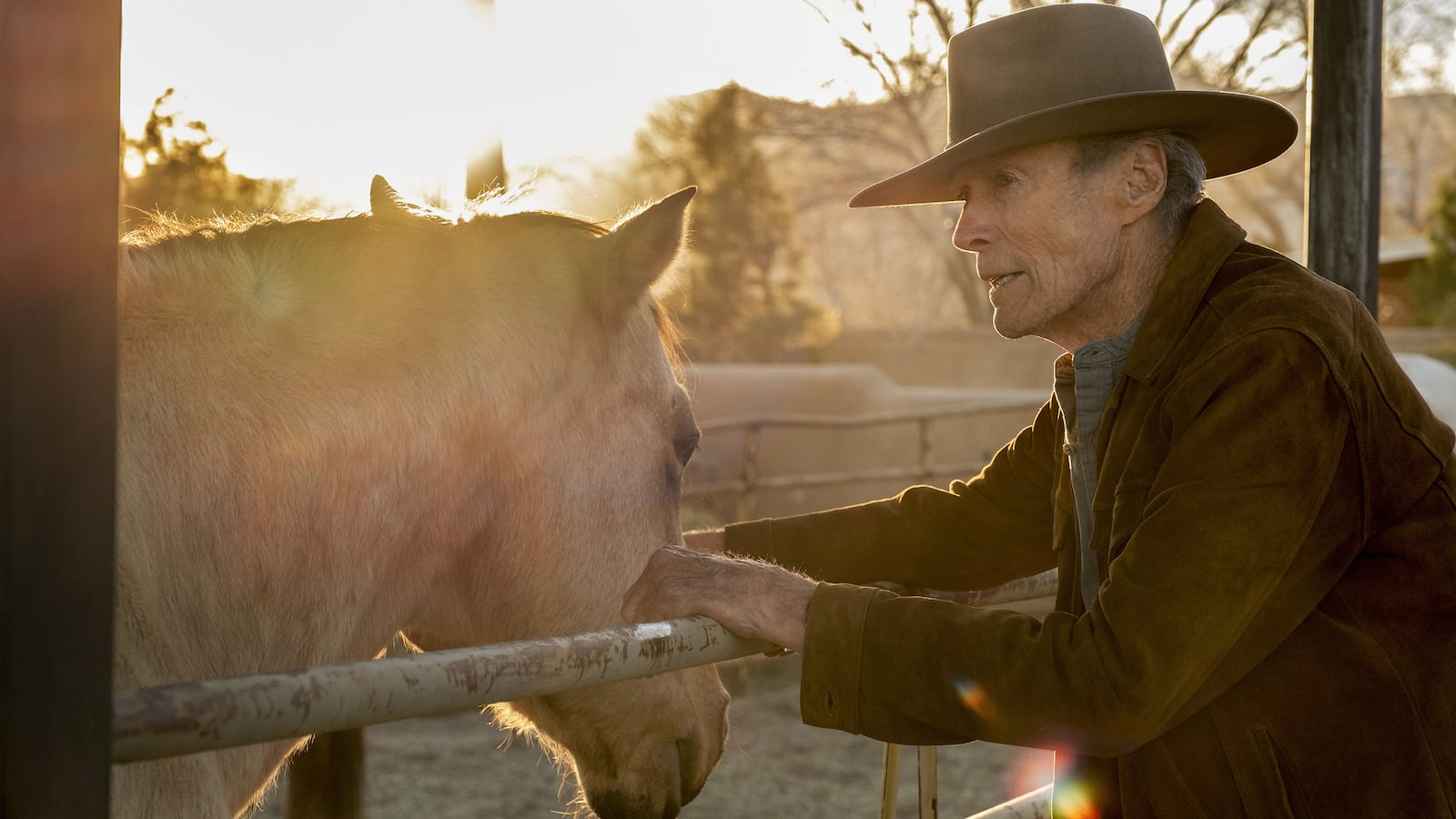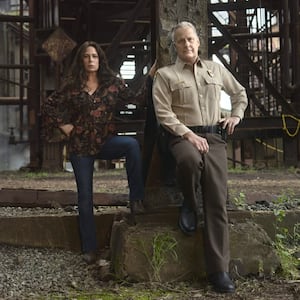Clint Eastwood is the last remnant of an era of “macho” Hollywood movie stars, and the shot that introduces him in Cry Macho—panning up from his cowboy boots to his wide-brimmed hat, his figure cast in silhouette as he steps out of an antique Chevrolet pickup truck—confirms that, even at age 91, he’s as imposingly masculine as ever. No matter a preceding image of a hand operating a vehicle’s shifter, Eastwood isn’t changing gears at this point in his career (and life), and his latest is yet another in a long line of superb films that pays homage to his legendary big-screen persona while simultaneously deconstructing the very tenets upon which it’s built.
An adaptation of a 1975 N. Richard Nash novel that numerous A-listers have previously tried to produce, Cry Macho (Sept. 17, in theaters and on HBO Max) is a tender and moving variation on a tale Eastwood has been telling, in altered forms, for decades. Mike Milo (Eastwood) is an ex-rodeo star and rancher who, in 1979, is fired by his boss Howard Polk (Dwight Yoakam), whom Mike promptly tells, “I’ve always thought of you as a small, weak and gutless man. But you know, there’s no reason to be rude.”
Mike takes shit from no one, but he’s also a broken-down loner with a history of tragedy and substance abuse. One year later, he’s living a solitary life—marked by sitting solo at dusk on a folding chair outside a modest residence decorated with ribbons, trophies, and newspaper clippings of his pre-injury glory days—when Howard reappears and collects on a debt by asking Mike to travel to Mexico to retrieve his son Rafo (Eduardo Minett), who lives with his supposedly abusive mother.
Mike acquiesces to this request, passing easily through a one-shack border patrol station and driving right up to the mansion of Rafo’s mom Leta (Fernanda Urrejola), a hot mess who points Mike in the direction of wayward Rafo, whom he finds at a cockfighting contest that’s broken up by the cops. After trying and failing to convince the kid to travel to Texas to see his dad, Mike rejects Leta’s sexual advances and, on his way out, discovers Rafo hiding in his backseat along with the boy’s pugilistic pet rooster, whom he’s dubbed Macho because, well, that cock is tough! The trio’s ensuing journey to America is interrupted by pursuing federales, compelling them to take refuge in a small town where they befriend widowed cantina owner Marta (Natalia Traven), who cares for her grandchildren and, like Leta, has googly-eyes for Mike, whose mixture of understated compassion, humility, and ruggedness apparently works like an aphrodisiac.
A strong rebound from 2019’s Trumpian Richard Jewell, Cry Macho is, on the one hand, a testament to Eastwood’s enduring (immortal?) virility. Mike is coveted by multiple women. He drags scrappy Rafo out of a car. He punches one of Leta’s henchmen. He rides a horse and breaks wild mustangs. He takes long walks—and slow-dances—with Marta. He mutters curses at cops who have the nerve to suspect he’s up to no good. And he holds a bad guy at gunpoint and, with Dirty Harry-grade grit, sneers, “You stay there, asshole.” Despite thinning gray hair, a face lined with wrinkles, a bony frame that exhibits only faint traces of his past stoutness, and a gait that could best be described as “patient,” Eastwood is a far cry from his matinee-idol heyday—or even the weathered gunslinger of 1992’s Unforgiven, the last time he took on a legitimate cowboy role—but the film nonetheless imagines him as just a slightly more rickety version of his former self.
Eastwood’s directorial efficiency is in full effect in Cry Macho, which moves at the same leisurely, resourceful pace as its protagonist, who gets things done without ever breaking a sweat. As written by Nick Schenk (Nash receives a posthumous co-writing credit), the story combines elements from many Eastwood predecessors (The Outlaw Josey Wales, Bronco Billy, Every Which Way but Loose, Million Dollar Baby, The Mule), fashioning a road-trip odyssey across the desert plains in which a grieving Westerner bonds with an animal, discovers a makeshift surrogate family, fells nefarious adversaries, and creates a new home for himself. Think of it as Eastwood playing the hits in a slightly different key, albeit not that different, what with the action shot and scored in the auteur’s typically classical style, his neat compositions steeped in genre iconography and his score full of melancholy piano and warm American and Western guitar twangs.
As the name of Rafo’s chicken illustrates, there’s nothing particularly subtle about Cry Macho, including the dynamic shared by Eastwood and Minett, a young actor whose somewhat mannered performance fits this borderline-corny tale. Yet the film coasts along with creaky, offhand grace. So easygoing are the proceedings that even Mike’s climactic trailer-worthy speech about the limits of machismo—“Let me tell you something: this macho thing is overrated”—goes down like a cold, cheap Mexican beer on a sweltering summer day. In that scene, Eastwood undercuts, for the umpteenth time, his no-nonsense Man with No Name and Dirty Harry image, expressing the damning emptiness of violence, and of gung-ho manliness, which costs individuals the very things that matter most in life, such as love, companionship, and solace from regret and alienation.
Cry Macho isn’t a fable about learning that lesson so much as one that’s guided by it, as well as by notions about bedrock moral codes that never quite die—such as Mike agreeing to Howard’s mission because he owes him—and the wisdom that comes with age. While playing house during their Mexican village pit-stop, Mike’s gift with animals turns him into a de facto local veterinarian, and when he’s asked to treat an ailing dog, he remarks, “I don’t know how to cure old” and suggests that the owners have the pup sleep with them. Eastwood is also incapable of turning back the hands of time, but as evidenced by Cry Macho, he still knows a thing or two about empathy and togetherness. And though his Mike takes his own advice and enjoys a couple of naps throughout the course of his adventure, moviegoers are lucky that the priceless filmmaker has yet to take his own professional siesta.






